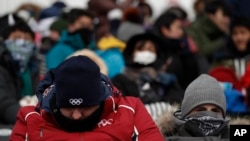The Pyeongchang Olympic organizers and the Korean public health organization have created a task force to contain an outbreak of the norovirus at the winter games, where more than 100 people have come down with the dreaded stomach bug.
The organizations say they are quarantining affected people, sanitizing affected areas and telling those who are potentially impacted what they should do to contain the virus.
South Korean Olympic organizers called in the police to take over from quarantined workers after some tested positive for the norovirus, a stomach bug that causes nausea, vomiting and diarrhea.
Dr. Cynthia Sears, an infectious disease expert at the Johns Hopkins School of Medicine in Baltimore, Maryland, told VOA how easily the virus is spread.
"Norovirus is a virus that's exceptionally contagious. It can be spread by simply touching surfaces," she said.
Norovirus can survive for days or even weeks on a variety of surfaces. And, Sears said, it only takes a small amount of the virus to infect someone.
"It can be spread by vomiting because it can aerosolize to some extent. People can pick up enough that way. It can be spread through the stool (fecal matter) if you accidentally get a little bit of feces on something," Sears said.
The virus spreads quickly between people, especially in close quarters like cruise ships and nursing homes. It can spread wherever there are crowds.
The norovirus can also be passed on through contaminated food and water, if the person handling it has the virus, or gets fecal matter on the food or in a drink.
Symptoms normally last for a few days, but afterward, the sickness causes fatigue.
The antidote is cleanliness. If food preparation surfaces are disinfected and food is cooked thoroughly, the virus's ability to survive is reduced.
The best defense is lots of hand washing and disinfecting any surfaces that might be contaminated, especially kitchens and bathrooms, and keeping your fingers away from your face.




